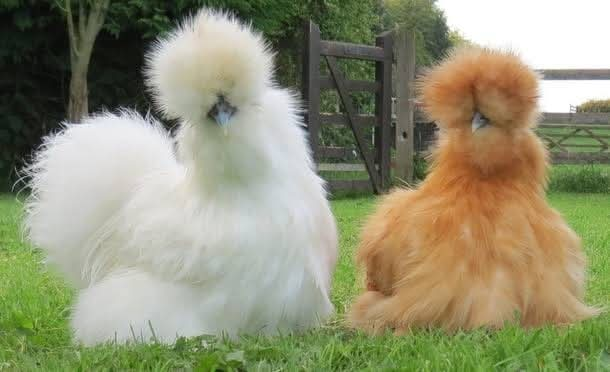Silkie Chicken: An Overview and Business Potential In Nigeria
Silkie Chicken: An Overview and Business Potential In Nigeria
Silkie chickens are a unique and popular breed, prized not only for their unusual appearance but also for their gentle nature and multipurpose utility in small-scale farming and commercial ventures. Recognizable for their fluffy plumage, dark skin, and endearing personality, Silkies have captured the interest of backyard poultry enthusiasts and specialty poultry businesses alike.
Characteristics of Silkie Chickens
1. Appearance: Silkies are known for their soft, fur-like feathers, which resemble silk, hence the name. These feathers lack barbicels, giving them a fluffy, almost mammalian look. They also have distinct physical traits like black or dark-blue skin, five toes (as opposed to the typical four in most chickens), and a walnut-shaped comb.
2. Behavior: Silkies are gentle and friendly, often displaying a docile and calm demeanor. This makes them ideal for families or small farms where they may interact with people, including children. Their calm nature also makes them easy to handle.
3. Egg Production: Silkies are not the highest egg producers compared to other chicken breeds. On average, they lay about 100–120 small, cream-colored eggs annually. However, they are exceptional mothers and often go broody, making them ideal for hatching eggs of other chicken breeds.
4. Meat Quality: Silkie chicken meat is considered a delicacy in some cultures, particularly in Chinese cuisine, where it is used in traditional medicine and cooking. Their meat is darker due to high melanin levels, which some people believe contributes to its health benefits.
Business Opportunities with Silkie Chickens
1. Egg Sales and Brooding Services
Market Demand: While Silkies are not prolific layers, there is a niche market for specialty eggs, particularly in urban areas where people value farm-fresh or unique eggs.
Brooding Services: Due to their tendency to go broody and their excellent mothering instincts, Silkie hens are often hired to hatch eggs of other breeds. This can be an additional service offered to local farmers who want to naturally incubate their eggs.
2. Meat Production
Cultural Market: Silkie meat is valued in Asian markets, particularly among Chinese and Vietnamese communities, for its perceived health benefits. It is used in specialty dishes and traditional medicines.
Health Foods Niche: For those targeting health-conscious consumers or unique culinary markets, Silkie meat can be marketed as a premium product, emphasizing its nutritional profile and purported health benefits.
3. Breeding and Selling Show Birds
Exhibition and Competitions: Silkie chickens are one of the most popular breeds in poultry shows, prized for their unique appearance and gentle temperament. Breeding show-quality Silkies can be profitable, especially for those selling to other enthusiasts or those looking to enter the exhibition arena.
Purebred Sales: High-quality, purebred Silkies can fetch good prices among backyard chicken enthusiasts and hobbyists who want ornamental or pet chickens. Marketing Silkies as friendly, easy-to-care-for pets can attract non-traditional chicken owners.
4. Educational Programs and Agritourism
Educational Opportunities: Silkies can be incorporated into petting zoos, educational farm programs, or as therapy animals in schools and community programs due to their gentle nature.
Agritourism: A farm that showcases specialty breeds like the Silkie can attract visitors. Offering tours, workshops on chicken care, and hands-on experiences with Silkies can create additional revenue streams, especially if packaged with other farm experiences.
5. Social Media and Online Sales
Digital Marketing: With the rise of social media, Silkies’ unique looks and friendly nature make them ideal for online content, which can drive interest and sales for both live birds and Silkie-related products.
Selling Eggs and Chicks Online: Using online platforms to sell hatching eggs, chicks, and even Silkie-related merchandise allows farmers to reach customers beyond their local area, especially those interested in rare or ornamental poultry breeds.
Key Considerations for Running a Silkie Chicken Business
1. Housing and Care: Silkies require dry, secure housing because their fluffy feathers make them less resistant to cold and wet conditions. Adequate protection from predators is crucial, as their gentle nature and limited flying ability make them more vulnerable.
2. Feeding and Health Management: Like all chickens, Silkies require a balanced diet to remain healthy, though they do not need specialized feed. It’s important to regularly check for lice and mites, as their fluffy plumage makes it easier for parasites to go unnoticed.
3. Legal and Zoning Compliance: Depending on the business model (selling meat, hatching eggs, or pets), ensure compliance with local regulations. This includes biosecurity measures, licenses, and, for meat sales, inspection compliance if selling in public markets or online.
4. Marketing Strategy: The most successful Silkie chicken businesses leverage niche marketing, emphasizing the breed’s uniqueness. Social media is a powerful tool, especially for visually appealing breeds like the Silkie. Platforms like Instagram, Facebook, and even YouTube can help you reach a broad audience, showcase your birds, and build a community of enthusiasts.
Financial Considerations
1. Initial Investment: The initial cost includes purchasing quality breeding stock, building suitable housing, and potentially investing in basic equipment for small-scale poultry farming (feeders, incubators if you are not relying on brooding).
2. Revenue Streams: Selling chicks, hatching eggs, brooding services, meat, and show birds are all potential revenue streams, allowing for diversified income. Agritourism and educational events can also enhance revenue.
3. Profit Margins: Profit margins depend on the model. Selling chicks or fertilized eggs typically has high margins relative to costs, while meat production can be less profitable due to lower yields and slower growth rates.
Conclusion
Silkie chickens represent a flexible and potentially profitable niche in the poultry industry. Whether as pets, for specialty meat, or in agritourism, their unique appearance and temperament set them apart. With careful planning and targeted marketing, a Silkie chicken business can cater to various consumer demands—from health-conscious culinary circles to families looking for friendly backyard pets.
